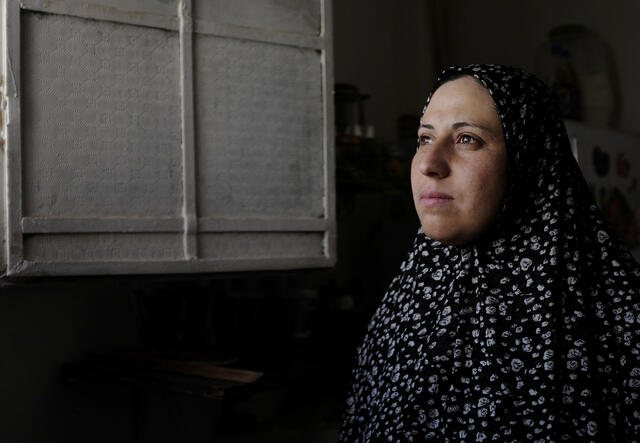Worried about the surge in fighting in their Dara’a, Syria neighborhood, 30-year-old Anwar and her family of six fled to Jordan in 2013. They had no means of earning money since it was nearly impossible for Syrian refugees to receive a work permit – a daily reality for many Syrian refugees living on the fringe.
The financial stress triggered tension and violence in their small one-bedroom apartment in Ramtha. With temporary cash assistance and individual counseling from the International Rescue Committee and other organizations, Anwar and her husband were able to create a peaceful home again.
She shared her story with me:

Life [during the] war was very difficult. I was living in fear and confusion. Because of his leg injury, my husband was not able to provide – so we had a hard time financially.
The war was psychologically draining. We had no money, no safety or security; we couldn’t leave the house. It turned into a place not fit for humans. It felt like the end of the world; like my family and I were just waiting for death.
Whenever a military plane would pass over our house in Syria, we huddled up in a corner. My children would urinate involuntarily all the time. Their lives were filled with violence; even the way they started playing referred to violence. They were very much influenced by the war.
We suffered a lot to get to Jordan; it was an extremely difficult journey. As soon as we stepped out [of our front door] to go, we had to turn back. There were airstrikes and bombings. But we knew there was a chance we might die either way, so we decided to take the risk and leave.
Airstrikes and gas bombs were still falling as we made our way. I remember saying, ‘Let’s just go back. All of life is full of bitterness and darkness. It’s not going to change.’ I remember we suffocated so many times from the gas bombs, but we continued until we reached Jordan.
The war was psychologically draining...It turned into a place not fit for humans. It felt like the end of the world; like my family and I were just waiting for death.
We first went to the Azraq [refugee] camp. I felt like it’s the same life as Syria; it was not easy to live there. I used to cry and pray for my life to change somehow. I wished to find a person I could talk to and help me lift this burden of worries.
I told my husband, 'Let’s rent a place [in the city], even if it’s just a room.’ Looking out on the streets, I thought about how nice it is for people to be living in peace – safety and security is a wonderful thing. My children asked me if we’re finally going to live a normal life.
Our place was small, but we finally felt safe. We had a little bit of money, but most of it was spent on the way to Jordan. My children would ask me to buy them new clothes or toys, but I couldn’t afford it.
Because of the financial stress, there were many fights with my husband. I would also hit my children and yell at them – this was another way I could vent. The only other thing I could do was cry. There was stress on top of more stress. There was a lot of violence at home, even before the war. We never solved anything without fighting, yelling and hitting.
I wanted to find something that would change my life. One of my friends told me about the [International Rescue Committee] women’s center, where I started to take individual counseling and parenting sessions. This is when my life started.
IRC counselors Ms. Ruba Zghoul and Ms. Ala’a Bishtawi would always tell me that I have inner strength, but I’m not able to show it. I used to tell them I don’t have the strength. Life is not that simple. I had a very negative outlook on life and opposed everything they would say.
But they gave me the strength to change my ways and start over. I was stuck in the past, not yet freed from it, but session after session, things changed for me.
I told the counselors one of the things causing stress was our financial situation, so I received 180 JODs ($250) each month for six months.
Each month, I put aside 100 JODs for rent. I would then purchase mostly food and water. I paid off my debts; I bought things for my children. It solved many problems. It gave me self-confidence.
But this was eight months ago. I’ve stopped receiving financial assistance now. But I continue to receive support from the IRC counselors.
First, they told me to divide our [one-bedroom apartment] between my husband and I and my children. They told me to give my children their space and freedom. They were happy and started hanging their drawings. Before, there was a lot of violence between my children. The counselors told me children absorb what’s happening around them. This really stuck in my head.
I started to listen to my husband when he would vent because he was also stressed. The counselors told me to count to 10 before I react to any argument, and when I did I really felt a difference.
I encouraged my husband to go to the IRC men’s center, which he refused at first but started to go and felt the change. He would come home calm after talking to other men.
The IRC really helped me deal with my children and husband. The cash assistance really lifted a heavy burden, so I’m trying to find a way forward now.
The IRC’s women’s center is funded by the European Commission for Humanitarian Aid and Civil Protection (ECHO) and other generous donors




